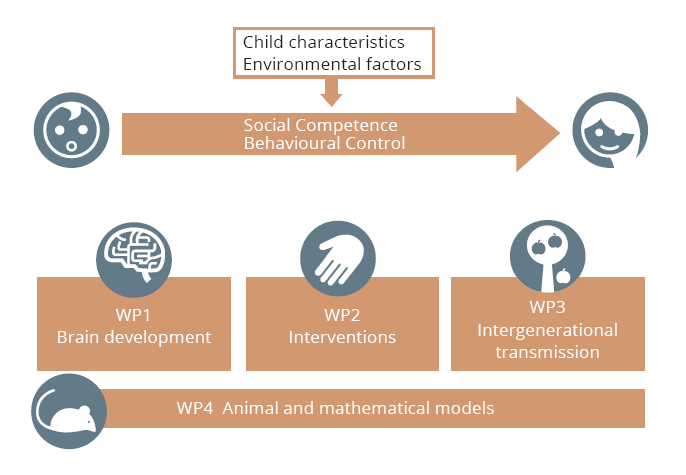Research structure
The Consortium on Individual Development (CID) aims to advance our knowledge and understanding of why some children thrive and others don’t. We plan to develop a model of how developmental differences between children arise and fill in crucial gaps in our knowledge.

Design: Taluut Utrecht
Six large cohorts
CID examines how the environment (family characteristics, parents and siblings, peers, and broader societal influences including media) and child characteristics (genetic makeup, temperament, and pre- and perinatal factors) affect the development of social competence (SC) and behavioural control (BC), skills that are essential for functioning in society and for reducing risk of behavioural and emotional problems.
Two new longitudinal child cohorts were set-up as part of CID: YOUth cohort and Leiden intervention cohort L-CID. The four others have been following children for over a decade: TRAILS (Tracking Adolescents’ Individual Lives Survey), Generation-R, RADAR (Research on Adolescent Development And Relationships) and NTR (Netherlands Twin Register).
Four work packages
Social competence and behavioural control are central CID measures and a common thread in our research. Within this joint focus, our four work packages (WPs) work on specific aspects of development: The role of brain development (WP1), Effects of interventions (WP2), The role of generational transmission in families (WP3), Animal and mathematical models of development (WP4).
Read more about the work packages.
CID measures
Behavioural control – The ability to control one’s emotions, behaviour, and impulses and to adapt to rules.
A general overview of the measures used within CID to track the development of these two aspects of behaviour is available, as well as more detailed descriptions of the rationale and choice of social competence and behavioural control measures. The detailed descriptions were made possible by Dr. Jolien van der Graaff (social competence) and Dr. Renske Koordeman (behavioural control).
